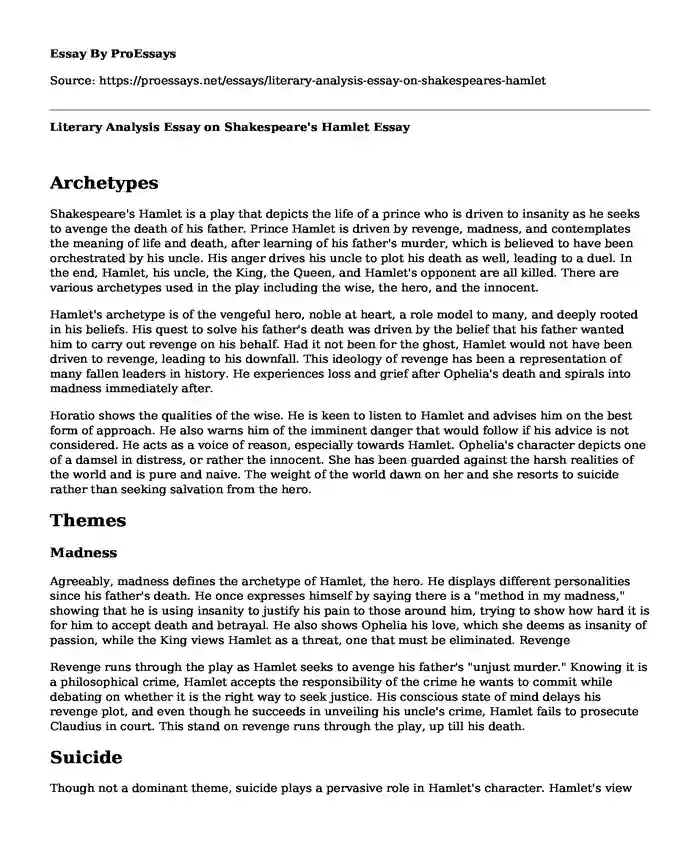Archetypes
Shakespeare's Hamlet is a play that depicts the life of a prince who is driven to insanity as he seeks to avenge the death of his father. Prince Hamlet is driven by revenge, madness, and contemplates the meaning of life and death, after learning of his father's murder, which is believed to have been orchestrated by his uncle. His anger drives his uncle to plot his death as well, leading to a duel. In the end, Hamlet, his uncle, the King, the Queen, and Hamlet's opponent are all killed. There are various archetypes used in the play including the wise, the hero, and the innocent.
Hamlet's archetype is of the vengeful hero, noble at heart, a role model to many, and deeply rooted in his beliefs. His quest to solve his father's death was driven by the belief that his father wanted him to carry out revenge on his behalf. Had it not been for the ghost, Hamlet would not have been driven to revenge, leading to his downfall. This ideology of revenge has been a representation of many fallen leaders in history. He experiences loss and grief after Ophelia's death and spirals into madness immediately after.
Horatio shows the qualities of the wise. He is keen to listen to Hamlet and advises him on the best form of approach. He also warns him of the imminent danger that would follow if his advice is not considered. He acts as a voice of reason, especially towards Hamlet. Ophelia's character depicts one of a damsel in distress, or rather the innocent. She has been guarded against the harsh realities of the world and is pure and naive. The weight of the world dawn on her and she resorts to suicide rather than seeking salvation from the hero.
Themes
Madness
Agreeably, madness defines the archetype of Hamlet, the hero. He displays different personalities since his father's death. He once expresses himself by saying there is a "method in my madness," showing that he is using insanity to justify his pain to those around him, trying to show how hard it is for him to accept death and betrayal. He also shows Ophelia his love, which she deems as insanity of passion, while the King views Hamlet as a threat, one that must be eliminated. Revenge
Revenge runs through the play as Hamlet seeks to avenge his father's "unjust murder." Knowing it is a philosophical crime, Hamlet accepts the responsibility of the crime he wants to commit while debating on whether it is the right way to seek justice. His conscious state of mind delays his revenge plot, and even though he succeeds in unveiling his uncle's crime, Hamlet fails to prosecute Claudius in court. This stand on revenge runs through the play, up till his death.
Suicide
Though not a dominant theme, suicide plays a pervasive role in Hamlet's character. Hamlet's view on suicide is based on religious analogy; that it is a sin, one that damns an individual to hell. His meditation on "to be or not to be" is a school of thought based on his religious beliefs on the concept. He disregards it because he finds it as an unholy act. However, Ophelia commits suicide because she could not come to terms with the harsh reality of the world and Hamlet's constant taunt.
Cite this page
Literary Analysis Essay on Shakespeare's Hamlet. (2022, Feb 12). Retrieved from https://proessays.net/essays/literary-analysis-essay-on-shakespeares-hamlet
If you are the original author of this essay and no longer wish to have it published on the ProEssays website, please click below to request its removal:
- Feminism in Frankenstein Essay
- Sigmund Freud Uncanny Essay
- The Role of Women in the Novel Scarlet Letter
- To Room Nineteen and Pride and Prejudice Passage Analysis Essay
- Statistics for the Behavioural Sciences Paper Example
- The Influence of Social Media on Teen's Self Esteem Paper Example
- Essay Example on the Power of Metaphor in Shakespeare's Midsummer Night's Dream







